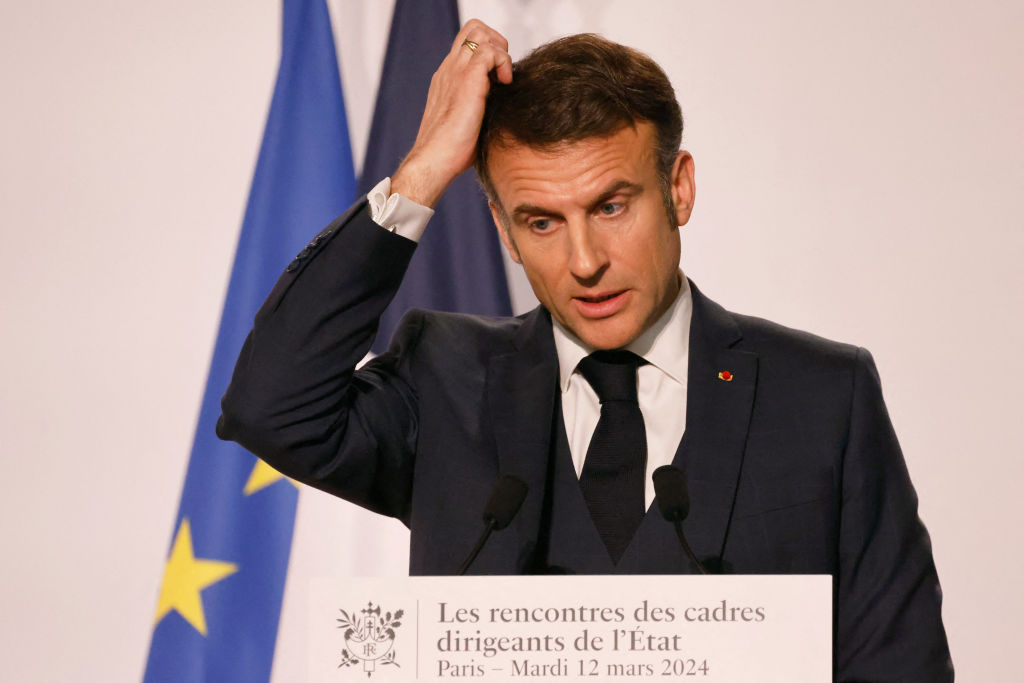Last week Emmanuel Macron inaugurated the Olympic aquatic centre that will host the swimming and diving events at this summer’s Paris games. The President was delighted with what he saw, boasting to the press pack that the centre is ‘exemplary from an environmental point of view’.
Macron’s party expect the Republicans to make their move in the coming weeks.
Unfortunately, from a financial point of view, the centre is anything but exemplary. The initial estimate in 2017 was that the centre would cost €70 million to construct, a figure that was soon revised to €90 million. the final expenditure was €188 million.
It is not just the Olympic aquatic centre where French budgeting has gone awry. The Republic’s accounts are a mess. Last month, France’s national statistics institute (Insee) announced that the country’s deficit has soared 22 per cent in one year to 5.5 percent of GDP, equivalent to €154 billion (£132 billion). This is 0.6 points – or €18 billion – more than anticipated. The head auditor, Pierre Moscovici, described the miscalculation as significant and ‘very, very rare’.
France’s public sector debt is 110.6 per cent of its GDP. It is the third most indebted country in the eurozone with only Italy and Greece in a worse situation.
The French press was united in condemning the government’s handling of the public finances. Le Monde accused the government of being in ‘denial’ over the alarming fiscal state of France, warning that a day of reckoning is approaching. ‘Since 2017, public spending has risen by €314 billion, and yet eight out of ten French people have expressed feeling that public services are deteriorating,’ said the paper’s editorial.
Le Figaro described the situation as a ‘nightmare’ for the government, particularly with important European elections only two months away. France is already the most taxed country in the EU (the tax to GDP ratio in France is 48.4 per cent; the Bloc average is 40.3 percent), and Macron has always insisted he will not inflict more tax hikes during his presidency. But according to Le Figaro, ‘to solve the impossible budgetary equation, the temptation to return to raising taxes is resurfacing’.
It is yet more humiliation for Macron, the ‘banking whizzkid’ as he was described in 2017 – the year he came to power. This was the man who was supposed to rehabilitate the French economy, but seven years later he has brought the country to the brink. Jordan Bardella, the president of the National Rally (NR), told an interviewer that ‘any private sector company would have sacked Emmanuel Macron for this’.
Jean-Francois Husson, the centre-right Republican senator in charge of the Senate’s budget commission, accused the government of overseeing a ‘state of failure’, adding that Bruno Le Maire, the minister of economy, was ‘discredited’.
It is the Republican party who are plotting to bring down the President’s government. This has been tried on four previous occasions since Macron was re-elected in 2022. Those motions of censure failed because they were tabled either by NR or La France insoumise (LFI), both of whom are too divisive to garner majority cross-party support in the National Assembly.
LR don’t have that problem. Furthermore, a motion of censure about the deterioration of the public finances is an issue around which all parties can rally. The LFI, NR, Communists and Socialists have all said they would support such a motion. ‘If it is tabled, yes, we will vote for it,’ said Christine Pirès-Beaune of the Socialist party. ‘We can’t carry on like this, with a government that doesn’t consult parliament on the country’s finances.’
Some are sceptical that the Republicans will table a motion of censure. To do so requires the signatures of 58 MPs, and Republicans have 62 seats in the National Assembly. Of all the opposition parties, however, the Republicans are most closely aligned to Macron’s Renaissance party; several of Macron’s government – including Bruno Le Maire and Interior Minister Gérald Darmanin – defected from the Republicans to Macron in 2017. Would enough Republicans be willing to sign a motion that would bring down a government that ideologically is close to their own?
They probably would, because they know that the future of the Republicans is at stake. The emergence of Macron and the rise of Le Pen has reduced the Republicans – the dominant force in the first half a century of the Fifth Republic – to almost a fringe party. To be the party that brought down the government of Macron might be the start of the Republicans’ rebirth as a political force.
Macron’s party expect the Republicans to make their move in the coming weeks. One of the Presidents’ entourage confided to Le Figaro last week: ‘If I were the LR [Republican] group, I would censure the government in May, a month before the [European] election…they need to turn the tables, become active players in the political life of their country again. It would be a very bad blow for Emmanuel Macron.’
If the motion of censure was passed, the President could try and do a deal with the Republicans, offering them senior positions in a coalition government. But the more likely scenario would be a dissolution of parliament and new legislative elections. It would be a bitter embarrassment for Macron, just weeks before the Paris Olympics; a reminder to France and the world that he presides over a chaotic country.
An even deeper embarrassment, however, would be the result of those legislative elections. Last December the Republicans commissioned a secret poll to discover which party would benefit most from new elections. The answer was Marine Le Pen, whose National Rally party would win between 243 and 305 seats (they currently have 88). If they were to win more than 289 seats the NR would have an absolute majority in parliament.
The Republicans would end up with around the same number of seats they have at the moment, which according to a party inside is an ‘encouraging stabilisation’.
As for Macron’s Renaissance party, their seats are predicted to plummet from 246 to between 117 and 165. He may have a future as an Olympic diver.








Comments